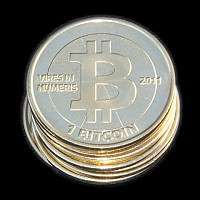Bitcoin Reaches New Milestone: DEA Confiscates Some Using Asset Forfeiture

Let's Talk Bitcoin reports that for what may be the first time ever, the DEA has seized bitcoins from a drug seller on Silk Road, the digital marketplace for drugs (and other things) that's hidden on the Tor network. The notification of asset forfeiture (which the DEA is required by law to post) is below:
DISTRICT OF SOUTH CAROLINA
13-DEA-581051, 11.02 Bitcoins, Acct.#1ETDwGUC1QcjYuehFr3u1FD3MvDaUs7SFy,
VL: $814.22 which was seized in Charleston, SC from Eric Daniel Hughes AKA Casey Jones on April 12, 2013
According to TechCrunch, Hughes "was described in some [Silk Road] postings as being an incautious drug salesperson." I asked for comment from the DEA earlier this week, but have yet to hear back. Here's Let's Talk Bitcoin speculating on how the seizure happened:
The Bitcoin address referenced in the complaint recieved a transaction for 11.02btc at 17:10:36 Blockchain time on the date noted as "seized". This could mean that either the DEA took control of a computer with an unencrypted wallet and transferred the amount to a DEA controlled wallet, or more likely that this was not an in-person confiscation at all. This could be an illicit "Silk Road" transaction, where US authorities set up a "honeypot" selling account, and accepted the 11.02btc as payment.
The honeypot scenario seems more likely as the sender-addresswas not emptied into the "DEA" account. There is one other transaction in the referenced account, for 17.24btc which entered 5/22/13 and is transferred out 5/28/13 - It moves through one intermediary account, is then combined into a block of 200btc and moves through an account that transacts only in 100 or 200btc blocks totaling 10,100btc. Following any one of those 200btc blocks leads you to apparent "mixer" transactions, small amounts of value peeling off of the larger amount at each hop. Taint analysis reveals that nearly 10% of those bitcoins eventually pass through an address responsible for transacting more than 419,000btc since 2012
With an anonymized blockchain, and lacking skilled forensic investigators (Are you one? Contact us!) it's hard to do anything but speculate.


Show Comments (4)